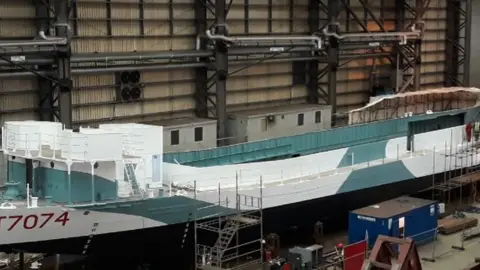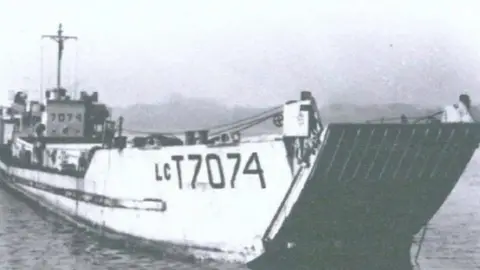Coronavirus: Delays add £75k to cost of D-Day landing craft work
 David Botwinik/Maritime Films UK
David Botwinik/Maritime Films UKDelays to restoration work on the last surviving D-Day tank landing craft have added £75,000 to its cost, the National Museum of the Royal Navy (NMRN) has said.
Work on the LCT 7074 in Portsmouth Naval Base was approaching its end when the pandemic struck.
Restoration was able to resume in May but the museum has appealed for donations to cover the increased cost.
The NMRN's Nick Hewitt said the project was proving to be a "unique challenge".
The museum had planned to move the 59m-long, 300-tonne ship to its new home outside the D-Day Story museum in Southsea in May.
Work had to be paused before it could be resumed under social distancing guidelines, meaning it had to stay in the naval bases's enormous ship fabrication hall.
The final stages of the work include the external camouflage paint finishes and the attaching of the restored funnel, replacement guns and rocket launchers, ahead of the internal fit out.
 Royal Navy
Royal NavyMr Hewitt said it had been "incredible what has been achieved in such a short space of time".
"Landing craft were built quickly and they weren't supposed to last longer than a few months. Sometimes the shipyards modified the designs to fit the parts and materials they had, so aspects of their design and build can feel 'improvised'," he said.
"We have had to adapt to how we fix issues or replicate techniques."
The project, which is supported by a £4.7m grant from The National Lottery Heritage Fund, now needs to raise an extra £75,000 by the end of August.
LCT 7074 was one of more than 800 specially-designed landing craft vessels taking part in D-Day.
It arrived at Gold Beach, surviving German shell fire which sank the craft next to it.
It put 10 tanks and a contingent of soldiers ashore at about 02:00 on 7 June 1944 before returning to England with prisoners of war.
Since 2014, the National Museum of the Royal Navy has led a project to rescue the amphibious craft from Birkenhead where it was sunk and semi-derelict.
